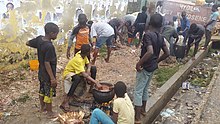
Back নাইজেরিয়ায় শিশুশ্রম Bengali/Bangla کودکان کار در نیجریه Persian Ìfọmọdé ṣiṣẹ́ ipá (Child Labour in Nigeria ) Yoruba

Child labour in Nigeria is the employment of children under the age of 18 in a manner that restricts or prevents them from basic education and development. Child labour is pervasive in every state of the country.[1] In 2006, the number of child workers was estimated at 15 million.[2][3] Poverty is a major factor that drives child labour in Nigeria. In poor families, child labour is a major source of income for the family.[2]
About 6 million of Nigeria's children do not go to school at all. In the current conditions, these children do not have the time, energy or resources to go to school. Domestic servants were the least visible form of child labour, and often sexually harassed. Amongst informal economy and public places, street vending employed 64%. Midst informal enterprises in semipublic places, children were often observed as mechanics and bus conductors.[4]
- ^ "Nigeria, still in the throes of child labour". Archived from the original on 2014-09-20. Retrieved 2014-09-17.
- ^ a b "Information Sheet - Child Labour in Nigeria" (PDF). UNICEF. 2006. Archived from the original (PDF) on 2017-01-19. Retrieved 2012-07-23.
- ^ "Modern Day Child Labour in Nigeria". CNN. August 22, 2011. Archived from the original on March 4, 2016. Retrieved July 23, 2012.
- ^ "Child Labour – Nigeria, 2006" (PDF). UNICEF. 2007. Archived from the original (PDF) on 19 January 2017. Retrieved 22 July 2012.
© MMXXIII Rich X Search. We shall prevail. All rights reserved. Rich X Search